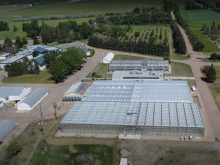Specialty canola varieties are catching the attention of farmers across
the Prairies this year.
They can bring premiums above the prices paid for canola sold in
conventional markets.
Dow AgroSciences’ Nexera and Cargill Specialty Canola Oils are two such
varieties.
Both are promoted in international markets for the quality of their oil.
Murray Hartman, an oilseed specialist with Alberta Agriculture, expects
Alberta farmers will plant at least 200,000 acres to specialty canola
this year.
Read Also

Alberta crop diversification centres receive funding
$5.2 million of provincial funding pumped into crop diversity research centres
He said the premiums are appealing, and because the crops can be grown
under contract, farmers gain an assured price.
But Hartman and other canola specialists note there are some tradeoffs
when growing the specialty varieties, particularly yields that tend to
be lower than those of the popular higher-yielding hybrids.
“You do have to weigh off the yield loss,” Hartman said.
“The yields are coming in at around the check varieties.”
While he considers the specialty varieties to be viable options,
Hartman said growers need to consider weed control.
Most of the specialty varieties do not have a herbicide tolerant trait.
“A couple of lines are Roundup Ready, but most of them are conventional
types,” Hartman said.
Because they are grown with traits tailored to specific markets, end
users tend to want an assurance that the specialty variety has been
kept separate from other canola.
That means producers growing those crops under contract may need to
take extra precautions to prevent contamination during harvest and
delivery.
Segregation and identity preservation often need extra documentation to
assure buyers they’re getting what they want, and growers might not
like the extra paperwork.
Bill Greuel, an oilseed specialist with Saskatchewan Agriculture, said
interest in specialty canola varieties is also strong in his province
this year. However, he said it’s difficult to estimate how much that
will translate into production.
Farmers recently learned that prices for canola sold into conventional
commodity markets will likely be lackluster in the new crop year, due
largely to the abundance of soybean production expected in the United
States and South America.
The premiums being offered to growers planting specialty canola can be
up to $1 per bushel, Greuel said.














